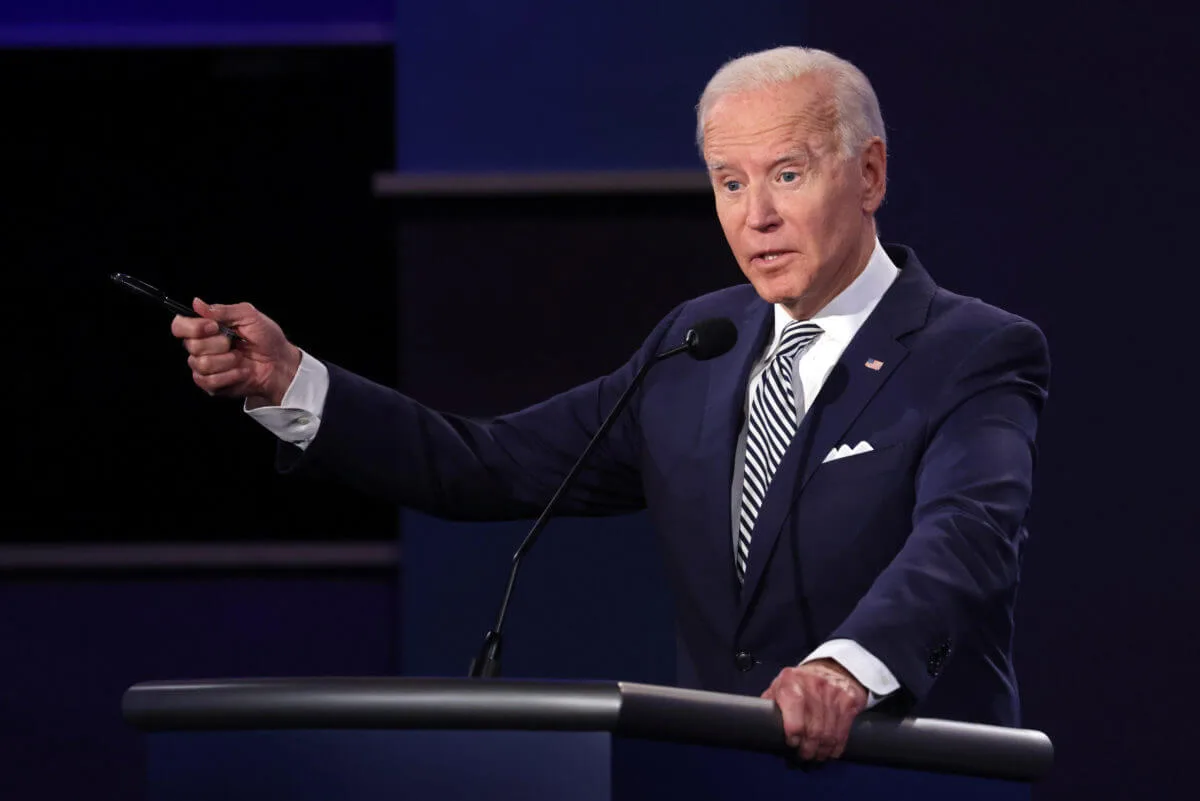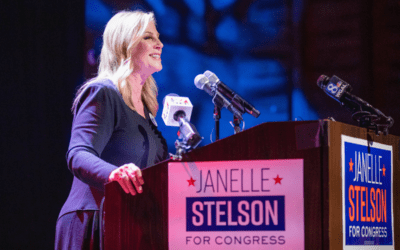
CLEVELAND, OHIO - SEPTEMBER 29: Democratic presidential nominee Joe Biden participates in the first presidential debate against U.S. President Donald Trump at the Health Education Campus of Case Western Reserve University on September 29, 2020 in Cleveland, Ohio. This is the first of three planned debates between the two candidates in the lead up to the election on November 3. (Photo by Scott Olson/Getty Images)
Trump’s verbal attacks on Biden Tuesday night were abusive in more ways than one. Yet, Biden pressed on.
We did it. We survived the first 2020 presidential debate between President Donald Trump and former VP and Democratic Presidential nominee Joe Biden.
Yet amid jokes about Trump’s unhinged behavior—during which he repeatedly screamed, ranted, and interrupted his opponent—and Biden’s at-times slow responses, I found myself triggered. While some people saw the former vice president’s difficulty getting his words out as a sign of his age, I saw someone who was trying not to stutter while enduring incessant verbal attacks.
Biden is a lifelong politician, yes, but he’s also a lifelong stutterer. He, like 3 million Americans, has a biological and neurological speech disorder that causes the flow of words to break up.
Biden has worked his entire life to overcome a speech disorder that is not curable. Therefore, it takes Biden and others who have this condition a little more time to communicate without stumbling. The mellifluous speeches you may remember from his younger days were probably memorized to obscure the disorder.
While a person can “recover” from stuttering, it can always return, and sometimes at the most inopportune moments—including a televised debate against someone who has no clue about decorum and no desire to appear presidential. Being yelled at and talked over are triggers and makes it difficult for those who have to work to overcome stuttering to communicate.
Sorting Fact From Fiction: Sign Up for The Keystone’s newsletter.
As the granddaughter of a lifelong stutterer (R.I.P. Grandpa Joe), the daughter of a recovered stutterer (my mother and Grandpa Joe’s daughter), the teacher of students who sometimes have speech disorders, and someone who had to overcome great anxiety over public speaking (which would cause me to stutter—and I sometimes still do), I want to remind readers that stuttering is an actual speech disorder. It does not reflect intelligence. Stuttering can be the result of genetics, speech delays, family dynamics, or a neurophysiological issue, such as a stroke or traumatic brain injury.
Unbeknownst to some fans, many celebrities and famous journalists are stutterers, including James Earl Jones, Emily Blunt, Samuel L. Jackson, John Stossel, Wayne Brady, Tim Gunn, Harvey Keitel, Byron Pitts, Nicole Kidman, Jimmy Stewart (actor), Marc Anthony, Marilyn Monroe, B.B. King, Bruce Willis, and Kendrick Lamar, to name a few.
I’m sure many of these folks will tell you too: Shame is a major part of dealing with stuttering because you are often teased about it, both as children and adults.
As the granddaughter of a lifelong stutterer (R.I.P. Grandpa Joe) … and someone who had to overcome great anxiety over public speaking (which would cause me to stutter—and I sometimes still do), I want to remind readers that stuttering is an actual speech disorder.
Growing up, Biden’s closest friends referred to him as Dash. As he writes in his book Promises to Keep, it wasn’t because he was fast on the football field; rather, it was because he sounded like Morse code when he spoke, due to his stuttering.
Biden is defined by and reminded regularly of his speech impediment. Last December, former Press Secretary Sarah Huckabee Sanders made fun of his stutter—which has returned since running for president—on Twitter. She later apologized, but her actions reflect the ways in which many people treat others who are a little different. You may recall President Trump mocking disabled reporter Serge Kovaleski, who has arthrogryposis, a congenital condition affecting the joints which often impacts his ability to speak clearly.
Biden, however, has used his disorder to relate to others. Who can forget that memorable Democratic National Convention speech earlier this year by 13-year-old Brayden Harrington: During their first meeting in New Hampshire, Biden told him they were “members of the same club.”
“It was really amazing to hear that someone like me became vice-president. He told me about a book of poems by Yeats he would read out loud to practice,” Harrington told the virtual convention. “He showed me how he marks his addresses to make them easier to say out loud. So I did the same thing today. And now I’m here talking to you today about the future, about our future.”
Trump’s verbal attacks on Biden Tuesday night were abusive in more ways than one. Yet, Biden pressed on, breaking the fourth wall, and speaking directly to the audience. He was and is relatable in a way his opponent will never be.
This week, Biden triumphed over his speech impediment to triumph over Trump. And as one of so many Americans who occasionally struggles to get her words out, I’m here for it.
READ MORE: ‘Mommy, She Looks Like You’: Why I Cried When I Got the Text About Joe Biden’s Pick for VP

For Rep. Susan Wild, supporting PA families includes reproductive rights and much more
Rep. Susan Wild wants to be very clear with Pennsylvanians: Donald Trump is committed to taking away women’s reproductive freedom, but he is not...

School districts working with anti-LGBTQ groups can cost your kids’ schools millions
Parents across South Central Pennsylvania are worried about the potential financial impacts working with anti-LGBTQ groups may have on their school...

VIDEO: Trump distances himself from his anti-abortion views
Donald Trump appeared on WGAL on Tuesday and continued to distance himself from his anti-abortion views claiming that reproductive rights are now a...

VIDEO: Community pushback gets school board to rescind decision on denying gay actor’s visit
Cumberland Valley School Board offered a public apology and voted to reinstate Maulik Pancholy as a guest speaker a week after the board voted to...

VIDEO: Project 2025 brings nuclear armageddon back into vogue
Project 2025 is a titanic document, with plans ranging from cutting half of all government employees to targeting reproductive rights on a scale...




